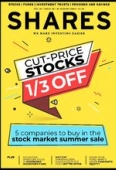Archived article
Please note that tax, investment, pension and ISA rules can change and the information and any views contained in this article may now be inaccurate.
Know your fund: what’s inside Fundsmith Equity?

Following our cover story on the risks associated with ‘star managers’, in the aftermath of the suspension of the flagship Woodford Equity Income Fund (BLRZQ73), we are launching a new feature looking at the UK’s most popular funds to analyse their investment process and their top holdings.
As we explained previously, when choosing a fund or trust it’s important to understand the manager’s process and why they own what’s in their portfolio. If you don’t understand or don’t feel comfortable, then don’t invest.
STAR QUALITY WITH A CLEAR PROCESS
One of the biggest and most successful funds since its launch in 2010, Fundsmith Equity (B41YBW7) is now valued at £18.3bn. Founded by star analyst-turned-fund manager Terry Smith, it has a very simple three-step investment process: buy good companies, don’t overpay and do nothing.
Rather than having a glossy brochure, the fund has a 20-page ‘Owner’s Manual’ for investors because ‘your understanding of what we are trying to achieve and how we will approach it is a critical element in enabling us to attain our goal’.
WHAT DOES IT SAY ON THE TIN?
Fundsmith invests in equities across the globe on a long-term basis using ‘stringent investment criteria’ to select only businesses:
> which are high-quality and can sustain a high return on operating capital employed (ROCE) whose advantages are difficult to replicate
> which do not require significant leverage to generate returns (therefore typically not banks or utilities) with a high degree of certainty of growth from re-investing their cash flows at high rates of return
> which are resilient to change, particularly technological innovation
> businesses at attractive valuations
By sticking to these criteria Fundsmith builds a portfolio of ‘resilient businesses with excellent performance’. Importantly, it is structured ‘to survive Terry Smith’s demise and continue with the same investment philosophy’.
The fund is also clear on what it won’t do: trade short-term or attempt to time the market, adopt hedging strategies or use derivatives, ‘hug’ the index, short stocks, or charge upfront fees or performance fees.
HOW DOES IT WORK IN PRACTICE?
With such a rigorous selection process it’s not surprising that few stocks make the grade. As the fact sheet explains, ‘the application of these investment criteria significantly limits the number of potential investments’.
The current number of holdings is 27, towards the top of the estimated range of 20 to 30 holdings at any given time. In the last year the portfolio turnover ratio – the percentage of the fund which has changed – is just 13.4% meaning only three or four stocks have been bought or sold.
Even more impressive, 11 of the stocks in the portfolio at the end of last year had been there since the fund was launched in 2010. This is the ‘do nothing’ approach. Good companies look after themselves and shareholders.
The top 10 holdings as of the end of June were, in descending order:
Paypal, Microsoft, Facebook, Amadeus, Idexx, Estee Lauder, Intuit, Philip Morris, Stryker and Novo Nordisk.
If we assume most investors will know half of these stocks, then for those who are unfamiliar with the other half:
Amadeus owns and operates the world’s number one travel distribution and reservation computer system and is listed in Spain.
Idexx designs and markets diagnostic testing equipment for monitoring animal health and analysing dairy products and is listed in the US.
Intuit produces accounting management and payroll software, not dissimilar to London-listed Sage (SGE), and its shares are also traded in the US.
Stryker designs and markets orthopaedic and surgical equipment, and is a rough lookalike for Smith & Nephew (SN.), and is listed in the US.
Finally, Novo Nordisk is one of the world’s leading producers of insulin and is listed in Denmark.
PERFORMANCE DATA
Every month the fund records its performance and explains which stocks added or detracted the most from returns. In June, the fund gained 3.8% thanks to positive contributions from Stryker, Estee Lauder, Idexx, Microsoft and Novo Nordisk. The worst performers were Reckitt Benckiser (RB.), Philip Morris, McCormick, Unilever (ULVR) and Diageo (DGE).
Up to the end of June the fund had gained just under 24% so far this year against 17% for its main benchmark, the MSCI World Index priced in sterling.
Last year, when 92% of UK funds in the Investment Association universe posted negative returns along with the stock market, Fundsmith posted a 2.2% gain putting it in the top 4% of performers.
Since launch on 1 November 2010, the fund had racked up gains of 358% to the end of June 2019 compared a return of 167% for the MSCI World Index and a return of 40% on UK five-year and 10-year Gilts (government bonds).
Importantly, it has a lot more up months than down months (roughly 70/30) and when it has a bad month the losses are smaller than in good months (best month +9.4%, worst month -6.9%). Therefore its average monthly return is +1.5%.
Finally, for those worried about liquidity, Fundsmith only invests in large, liquid stocks and has no unlisted holdings whatsoever. Despite its size, the managers say that 60% of the fund could be liquidated in seven days if it were ever necessary.
SHARES SAYS:
Fundsmith excels at communicating its strategy. The fund’s process is crystal clear and only picks long-term winners. It is also designed to survive Terry Smith’s demise as the manual says cheerfully. It is easy to see why this is the UK’s most popular fund. Buy and hold for the long term.
Important information:
These articles are provided by Shares magazine which is published by AJ Bell Media, a part of AJ Bell. Shares is not written by AJ Bell.
Shares is provided for your general information and use and is not a personal recommendation to invest. It is not intended to be relied upon by you in making or not making any investment decisions. The investments referred to in these articles will not be suitable for all investors. If in doubt please seek appropriate independent financial advice.
Investors acting on the information in these articles do so at their own risk and AJ Bell Media and its staff do not accept liability for losses suffered by investors as a result of their investment decisions.

 magazine
magazine










